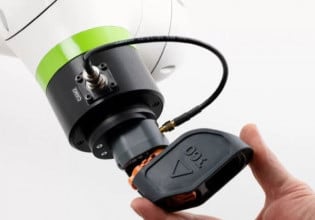M
Michael Griffin
In reply to William Sturm: The following is a bit of a long story, but I think the background is necessary to explain what I think is going on.
I believe what you are referring to is a version of Windows XP that Microsoft is working on for the OLPC XO laptop computer. This is a small low cost laptop that has been developed by a charitable organisation as a dedicated educational tool for children in lower income countries (http://www.olpc.org). The existing software is based on Linux, with a custom user interface and application software foundation (it's customised for educational use). The target price for this laptop is $100.
Microsoft is very unhappy about this project because it doesn't use Windows and have tried (unsuccessfully) to get it stopped. The people who are running the OLPC XO project say it's an open platform, and if Microsoft wants to try to shoehorn their operating system into it, then nobody is going to stop them (although what Windows would actually accomplish without the XO educational software is questionable).
What has been in the press lately is Microsoft has said they will try to strip down Windows XP enough to fit it on the platform, and also develop Windows drivers for it (normally they leave that up to the hardware manufacturers). The Microsoft PR people have been saying they expect to have something some time towards middle to late next year (which is the time you mentioned). The head Microsoft engineer for the project though was interviewed by the press where he cast doubt on whether this is feasible or if it is, then when they might have something. Microsoft has asked OLPC to beef up the hardware design to accommodate Windows, but the OLPC organisation has said that idea is a non-starter because they are already over their cost target.
So at this point there is a lot of question as to whether "Windows XP Lite" project will continue. At present it exists mainly due to internal politics in Microsoft as it was started as a knee-jerk reaction to the OLPC XO.
If Windows XP "Lite" ever comes into existence, it will be restricted to certain applications in cost sensitive markets. You won't be able to buy it for general purpose use. It's strictly intended for use as a marketing tool in trying to prevent the use of Linux in high profile applications and will not be for general sale. Microsoft will give it away for nothing if necessary, but they don't want to undercut their normal revenue sources. There's no money for them in that market, but they are concerned about protecting their effective monopoly in the business PC market where they make most of their profit.
The Windows XP "Lite" idea is being rushed out to meet a threat that has caught Microsoft flat-footed. At first there was just the OLPC, but in the past year there have been several other very low cost and low power computers which have come out (e.g. the Asus Eee laptop and the Everex "Green PC"). Both the Eee and the "Green PC" (so called because of the lower power consumption) are or will be available with Windows, but only in higher cost versions with beefed up hardware.
The current version of Microsoft Windows (Vista) has so far been a disaster. Running it on normal high power PC hardware has caused numerous complaints. Trying to fit it into the new class of small, low power, low cost computers is out of the question. On the other hand, keeping Windows XP on the market can't be anything more than a stop gap because its age is showing. For example, the stock version doesn't even support SATA hard drives, which have become standard hardware in modern PCs.
Microsoft has already started work on the replacement for Vista, but that isn't due for a couple of years yet (assuming they manage to meet their schedule). It is possible that they could use that opportunity to come with both "lite" and "full bloat" versions of Windows.
The problem with a "lite" version though is that too many people might actually want it. Microsoft uses Windows as a platform for getting their other products into the market. For example, the biggest thing they are trying to push at present is their DRM system (copy protection for entertainment). If they can get their DRM system entrenched in the market as the de facto standard, then they hope to collect royalties from music, movies, DVDS, etc. which use it. The DRM system has been a massive headache for hardware companies trying to write drivers for Vista (which is one of the reasons for Vista's poor hardware support record) but it's all pervasive in Vista and so isn't easily removed.
Stripping the "bloat" out of Windows Vista would mean stripping out DRM and a number of other strategic technologies which Vista was supposed to deliver to Microsoft. A version suitable for use in industrial applications is therefore unlikely, as that market is too small to interest Microsoft. Microsoft's idea of "embedded" involves entertainment systems for things like delivering video or music over the internet. These all involve heavy use of DRM, which is what Vista was created for.
It is possible that Microsoft will reverse course and write off Vista as a bad idea. That might require a major shake up in upper management though, and I don't think they're that worried yet.
If you want to see how small a Windows-like *could* be, have a look at ReactOS. This is a clone of Windows written by a group of hobbyists. The ISO image is only 27 megabytes. It's supposed to be more or less equivalent to Windows 2000, although I've never been able to get it to do very much other than crash (running it in a QEMU emulator). Compare that to Windows Vista which is more than 2 orders of magnitude larger.
I believe what you are referring to is a version of Windows XP that Microsoft is working on for the OLPC XO laptop computer. This is a small low cost laptop that has been developed by a charitable organisation as a dedicated educational tool for children in lower income countries (http://www.olpc.org). The existing software is based on Linux, with a custom user interface and application software foundation (it's customised for educational use). The target price for this laptop is $100.
Microsoft is very unhappy about this project because it doesn't use Windows and have tried (unsuccessfully) to get it stopped. The people who are running the OLPC XO project say it's an open platform, and if Microsoft wants to try to shoehorn their operating system into it, then nobody is going to stop them (although what Windows would actually accomplish without the XO educational software is questionable).
What has been in the press lately is Microsoft has said they will try to strip down Windows XP enough to fit it on the platform, and also develop Windows drivers for it (normally they leave that up to the hardware manufacturers). The Microsoft PR people have been saying they expect to have something some time towards middle to late next year (which is the time you mentioned). The head Microsoft engineer for the project though was interviewed by the press where he cast doubt on whether this is feasible or if it is, then when they might have something. Microsoft has asked OLPC to beef up the hardware design to accommodate Windows, but the OLPC organisation has said that idea is a non-starter because they are already over their cost target.
So at this point there is a lot of question as to whether "Windows XP Lite" project will continue. At present it exists mainly due to internal politics in Microsoft as it was started as a knee-jerk reaction to the OLPC XO.
If Windows XP "Lite" ever comes into existence, it will be restricted to certain applications in cost sensitive markets. You won't be able to buy it for general purpose use. It's strictly intended for use as a marketing tool in trying to prevent the use of Linux in high profile applications and will not be for general sale. Microsoft will give it away for nothing if necessary, but they don't want to undercut their normal revenue sources. There's no money for them in that market, but they are concerned about protecting their effective monopoly in the business PC market where they make most of their profit.
The Windows XP "Lite" idea is being rushed out to meet a threat that has caught Microsoft flat-footed. At first there was just the OLPC, but in the past year there have been several other very low cost and low power computers which have come out (e.g. the Asus Eee laptop and the Everex "Green PC"). Both the Eee and the "Green PC" (so called because of the lower power consumption) are or will be available with Windows, but only in higher cost versions with beefed up hardware.
The current version of Microsoft Windows (Vista) has so far been a disaster. Running it on normal high power PC hardware has caused numerous complaints. Trying to fit it into the new class of small, low power, low cost computers is out of the question. On the other hand, keeping Windows XP on the market can't be anything more than a stop gap because its age is showing. For example, the stock version doesn't even support SATA hard drives, which have become standard hardware in modern PCs.
Microsoft has already started work on the replacement for Vista, but that isn't due for a couple of years yet (assuming they manage to meet their schedule). It is possible that they could use that opportunity to come with both "lite" and "full bloat" versions of Windows.
The problem with a "lite" version though is that too many people might actually want it. Microsoft uses Windows as a platform for getting their other products into the market. For example, the biggest thing they are trying to push at present is their DRM system (copy protection for entertainment). If they can get their DRM system entrenched in the market as the de facto standard, then they hope to collect royalties from music, movies, DVDS, etc. which use it. The DRM system has been a massive headache for hardware companies trying to write drivers for Vista (which is one of the reasons for Vista's poor hardware support record) but it's all pervasive in Vista and so isn't easily removed.
Stripping the "bloat" out of Windows Vista would mean stripping out DRM and a number of other strategic technologies which Vista was supposed to deliver to Microsoft. A version suitable for use in industrial applications is therefore unlikely, as that market is too small to interest Microsoft. Microsoft's idea of "embedded" involves entertainment systems for things like delivering video or music over the internet. These all involve heavy use of DRM, which is what Vista was created for.
It is possible that Microsoft will reverse course and write off Vista as a bad idea. That might require a major shake up in upper management though, and I don't think they're that worried yet.
If you want to see how small a Windows-like *could* be, have a look at ReactOS. This is a clone of Windows written by a group of hobbyists. The ISO image is only 27 megabytes. It's supposed to be more or less equivalent to Windows 2000, although I've never been able to get it to do very much other than crash (running it in a QEMU emulator). Compare that to Windows Vista which is more than 2 orders of magnitude larger.






